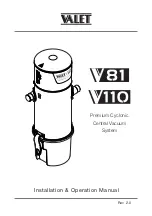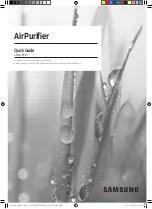
GENERAL SAFETY INSTRUCTIONS
FOR POWER TOOLS
1. KNOW YOUR TOOL.
Read and understand the owners
manual and labels affixed to the tool. Learn its application and
limitations as well as its specific potential hazards.
2. GROUND THE TOOL.
This tool is equipped with an approved
3-conductor cord and a 3-prong grounding type plug to fit the
proper grounding type receptacle. The green conductor in the
cord is the grounding wire.
NEVER
connect the green wire to a
live terminal.
3. KEEP GUARDS IN PLACE.
Keep in good working order, prop-
erly adjusted and aligned.
4. REMOVE ADJUSTING KEYS AND WRENCHES.
Form habit
of checking to see that keys and adjusting wrenches are re-
moved from tool before turning it on.
5. KEEP WORK AREA CLEAN.
Cluttered areas and benches in-
vite accidents. Make sure the floor is clean and not slippery due
to wax and sawdust build-up.
6. AVOID DANGEROUS ENVIRONMENT.
Don’t use power tools
in damp or wet locations or expose them to rain. Keep work
area well lit and provide adequate surrounding work space.
7. KEEP CHILDREN AWAY.
All visitors should be kept a safe dis-
tance from work area.
8. MAKE WORKSHOP CHILD-PROOF.
-with padlocks, master
switches or by removing starter keys.
9. USE PROPER SPEED.
A tool will do a better and safer job
when operated at the proper speed.
10. USE RIGHT TOOL.
Don’t force the tool or the attachment to do
a job for which it was not designed.
11. WEAR PROPER APPAREL.
Do not wear loose clothing, gloves,
neckties or jewelry (rings, watch) because they could get caught
in moving parts. Non-slip footwear is recommended. Wear pro-
tective hair covering to contain long hair. Roll up long sleeves
above the elbows.
12. ALWAYS WEAR SAFETY GLASSES.
Always wear safety
glasses (ANSI Z87.1). Everyday eyeglasses only have impact
resistant lenses, thet are
NOT
safety glasses. Also use a face
or dust mask if operation is dusty.
13. DON’T OVERREACH.
Keep proper footing and balance at all
times.
14. MAINTAIN TOOL WITH CARE.
Keep tools sharp and clean for
best and safest performance. Follow instructions for lubricating
and changing accessories.
15. DISCONNECT TOOLS.
Before servicing, when changing acces-
sories or attachments.
16. AVOID ACCIDENTAL STARTING.
Make sure the switch is in the
‘’OFF’’ position before plugging in.
17. USE RECOMMENDED ACCESSORIES.
Consult the manual for
recommended accessories. Follow the instructions that accom-
pany the accessories. The use of improper accessories may
cause hazards.
18. NEVER STAND ON TOOL.
Serious injury could occur if the tool
tips over. Do not store materials such that it is necessary to
stand on the tool to reach them.
19. CHECK DAMAGED PARTS.
Before further use of the tool, a
guard or other parts that are damaged should be carefully
checked to ensure that they will operate pro- perly and perform
their intended function. Check for alignment of moving parts,
breakage of parts, mounting, and any other conditions that may
affect its operation. A guard or other parts that are damaged
should be properly repaired or replaced.
20. NEVER LEAVE MACHINE RUNNING UNATTENDED.
Turn
power ‘’OFF’’. Don’t leave any tool running until it comes to a
complete stop.
SPECIFIC SAFETY INSTRUCTIONS FOR YOUR AIR CLEANER
1.
DO NOT ATTEMPT TO REMOVE OR REPLACE THE FILTER(S)
WHILE THE MACHINE IS IN OPERATION. MAKE SURE AIR
CLEANER IS DISCONNECTED FROM THE POWER SOURCE.
2.
DO NOT OPERATE THE AIR CLEANER WITHOUT THE FILTERS
IN PLACE TO AVOID EXPOSURE TO ROTATING PARTS AND
OVERLOADING THE MOTOR.
3.
THE USE
of filters and attachments which are not recommended
may result in product damage or the risk of personal injury.
4. When suspending the Air Cleaner from the ceiling
MAKE CERTAIN
the hardware is securely anchored into a wood structure. Always
keep a minimum of 7 feet between bottom of Air Cleaner and the
floor surface to allow for adequate head clearance. Also, use only
properly sized chain to prevent the tool from falling.
5.
TO REDUCE THE RISK OF ELECTRICAL SHOCK,
do not expose
to water or rain, and do not lift the Air Cleaner by the power cord.
DO NOT
use the power cord as a hanging device.
6. When used in the portable application,
MAKE CERTAIN
the Air
Cleaner is adequately supported, or securely clamped to the work
surface to eliminate any potential for movement or damage from
falling.
7.
ALWAYS WEAR ADEQUATE EYE PROTECTION.
8.
WHEN NOT IN USE, BE CERTAIN TO STORE AIR CLEANER IN
A SAFE LOCATION TO ELIMINATE THE POTENTIAL OF DAM-
AGE TO THE POWER CORD OR TRIPPING HAZARDS.
9.
MAINTAIN TOOLS IN TOP CONDITION.
Keep filters clean for op-
timum performance. Follow instructions for changing and cleaning
filters.
10.
DANGER: DO NOT
use this machine to filter any metal dust. Com-
bining wood and metal dust can create an explosive hazard. This
Air Cleaner is intended to be used to filter non-explosive atmos-
pheres only.
11.
IF YOU ARE NOT
thoroughly familiar with the operation of the Air
Cleaner, obtain advice from your supervisor, instructor or other
qualified person.
12.
WARNING: DO NOT
operate your Air Cleaner until it is completely
assembled and installed according to the instruction manual.
13.
PLACE POWER CORD IN A SAFE LOCATION TO ELIMINATE
TRIPPING HAZARDS.
14.
USE FACE OR DUST MASK AND EYE PROTECTION.
WARNING:
The dust generated by certain woods and wood
products can be hazardous to your health. Always operate machin-
ery in well-ventilated areas and provide for proper dust removal.
15.
WARNING: TO AVOID A POTENTIALLY DANGEROUS SITUA-
TION, DO NOT USE AIR CLEANER TO DISSIPATE FUMES OR
SMOKE.
This Air Cleaner is intended for use in non-explosive, non-
metallic atmospheres where only dry airborn dust is present.

























